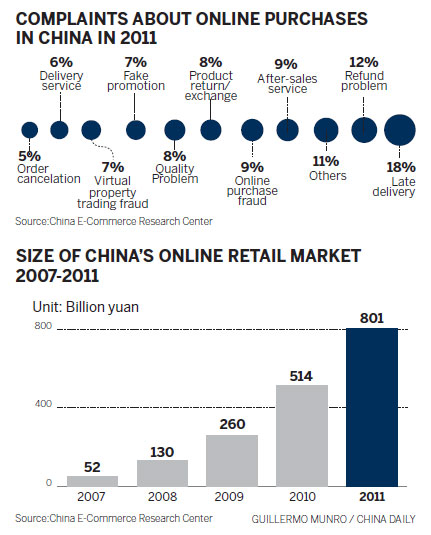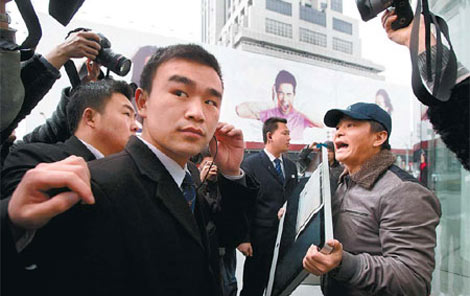 |
|
|
|
|||||||||||
In a major effort to protect customers' interests, China has pledged to regulate online group buying, a thriving market with increasing illegal trading activities in recent years.
The State Administration for Industry and Commerce urged its local authorities to examine the qualifications of online group buying providers and supervise them, according to the latest circular posted on the administration's website on Wednesday.
|
 |
Problems such as fraud, fake products and price hikes are arising frequently as the industry becomes popular in China, the circular said.
"Disputes and complaints related to online group buying have seen a sharp rise," the administration noted.
According to a report released on Wednesday by China E-Commerce Research Center, an independent research institute based in Hangzhou, Zhejiang province, a total of 203 million people participated in online shopping in China in 2011, up 28.5 percent from the previous year.
The country's online retail sales reached 801 billion yuan ($126.5 billion) last year, a sharp increase from 514 billion yuan in 2010, the report said.
As the group-buying market thrives in China, the number of group-buying websites hit 3,909 in December, up from 2,630 in January last year, the institute's statistics showed.
The institute collected about 100,000 complaints related to e-commerce via its online platform last year, 25 percent of which involved online group buying, the report said.
"At present, online shopping gets so many complaints because the country now lacks strict regulations and supervision of such service providers," Wu Xuefei, a senior researcher at the institute, told China Daily on Thursday.
In May, gaopeng.com, a Chinese group buying portal launched by Groupon Inc and Tencent Holdings Ltd, fired a vice-president after discovering that some of its employees were found to have cheated in an iPhone lottery on weibo, the Chinese version of Twitter.
The scandal drew online queries about the credibility of the website when the "lucky winners" turned out to be gaopeng's employees.
"It is certain that consumers will lose confidence in online group buying, if such scandals continue to hit them in future," she said.
Analysts said the latest circular is timely and will boost a sound development of the online group buying industry.
"I spent 400 yuan to purchase a spa treatment service through online group buying last year. Since so many consumers bought the product in such a short time, I could not have my spa service within the specified date and my payment finally became invalid," Wang Xin, a 28-year-old Beijing consumer, said.
Such complaints may be avoided if group buying websites are required to clarify details on delivery, payment, exchange and the return of goods and services before trading, according to the circular.
The circular prohibits online group buying providers from refusing to return an advance payment when the time limit is exceeded and the service becomes invalid. It also bans unfair competition, Wu said.
"Currently, many luxury goods are not authorized to be sold via the Internet. However, since there is a lack of strict regulations on overseas purchasing, some luxury goods are pouring into the domestic market and are being sold at lower prices through online group buying," she said.
Juhuasuan.com, the group buying platform of taobao.com, announced in March that a total of 50 million yuan will be used to compensate consumers for their losses.
In 2011, 10.83 million consumers participated in group buying on juhuasuan.com, with more than 10 billion yuan of trading volume, said Lu Qi, a staff member of public relations at taobao.com.
Automobile complaints on the rise, quality watchdog says Complaints about the quality of automobiles increased by more than 20 percent last year, China's top quality watchdog said on Thursday. The General Administration of Quality Supervision, Inspection and Quarantine received 8,840 complaints involving 148 auto manufacturers and tire makers, said Liu Hongsheng, an official from the administration. That represents a 20.8 percent increase over the previous year. Liu did not name the companies, but said the complaints involved braking systems, wheels, engines and drivetrains. Of the complaints, 16.8 percent concerned vehicles purchased within one year and 33.3 percent involved vehicles between one and two years old. China issued 85 automobile recalls in 2011, involving some 1.82 million vehicles. About 1.71 million of the cars recalled were domestic models. In the face of increasing quality requests and complaints, new legislation on auto recalls is expected to be released this year, an unnamed official from the administration said. -- Jin Zhu |
Contact the writer at?jinzhu@chinadaily.com.cn
Wu Ying, iPad, Jeremy Lin, Valentine's Day, Real Name, Whitney Houston, Syria,Iranian issue, Sanyan tourism, Giving birth in Hong Kong, Cadmium spill, housing policy

|

|

|

|

|

|